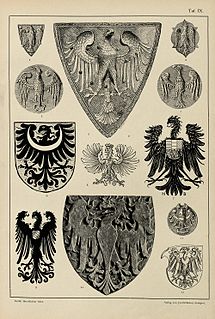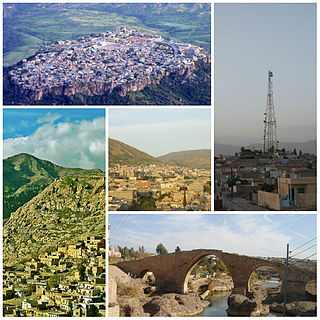
Kirkuk Governorate or Kirkuk Province is a governorate in northern Iraq. The governorate has an area of 9,679 square kilometres (3,737 sq mi). In 2017 the estimated population was 1,259,561 people. The provincial capital is the city of Kirkuk. It is divided into four districts.

Peshmerga, meaning Those who face death are the military forces of the autonomous region of Kurdistan Region of Iraq. Since the Iraqi Army is forbidden by Iraqi law to enter Kurdistan Region, the Peshmerga, along with their security subsidiaries, are responsible for the security of Kurdistan Region. These subsidiaries include Asayish, Parastin u Zanyarî and the Zeravani (Gendarmerie). Peshmerga predates Iraq, starting out as a strictly tribal pseudo-military border guard under the Ottomans and Safavids and later changing to a well-trained, disciplined guerrilla force in the 19th century.
The Iraqi Turkmen Front is a political movement founded in 1995 which seeks to represent the Iraqi Turkmen people. Since the fall of Saddam Hussein in 2003, the ITF has contested control of Kirkuk and other areas of northern Iraq. The ITF claims that Kirkuk belongs to the Turkmen people although they compose only 13–17 percent of the population.

The coat of arms or state emblem of Iraq is a golden black eagle looking towards the viewer's left dexter. The eagle is the Eagle of Saladin associated with 20th-century pan-Arabism, bearing a shield of the Iraqi flag, and holding a scroll below with the Arabic words جمهورية العراق.
Kurdification is a cultural change in which non-ethnic Kurds or/and non-ethnic Kurdish area or/and non-Kurdish languages becomes Kurdish. This can happen both naturally and deliberately.

The Kurdistan Democratic Party, usually abbreviated as KDP or PDK, is one of the main Kurdish parties in Iraqi Kurdistan and is led by the Barzani family. It was founded in 1946 in Mahabad in Iranian Kurdistan. The party claims it exists to combine "democratic values and social justice to form a system whereby everyone in Kurdistan can live on an equal basis with great emphasis given to rights of individuals and freedom of expression."
This is a list of public holidays in Iraq.

The disputed territories of Northern Iraq are regions defined by article 140 of the Constitution of Iraq as being Arabised during Baath Party rule in Iraq. Most of these regions are inhabited by non-Arabs, most notably by Kurds, Assyrians, Yazidis, Turkmens/Turkomans, and Shabaks.
Soran Mama Hama was a reporter for Livin magazine in Kirkuk, Kurdistan, Iraq. He was shot by unidentified gunmen and died in Kirkuk at approximately 9 p.m. on July 22, 2008 in the suburban Kirkuk neighborhood of Shorija. Hama's death remains unsolved after four years. It is believed that he was the victim of the very corrupt police and government personnel, which he had previously reported on.

Kurds in Iraq are people born in or residing in Iraq who are of Kurdish origin. The Kurds are the largest ethnic minority in Iraq, comprising between 15% and 20% of the country's population according to the CIA World Factbook.

Human rights in Iraqi Kurdistan refer to the human rights issue in the autonomous area of Iraqi Kurdistan, which is under the jurisdiction of Kurdistan Regional Government since 1992.

Relations of Kurdistan Region of Iraq with foreign states and organizations are conducted by the Kurdistan Regional Government (KRG). Political stability and a rapidly developing economy have given the KRG the opportunity to pursue a foreign policy independent from the central government's. The KRG's primary body for directing its foreign affairs is the Department of Foreign Relations (DFR). The DFR's foremost objectives are to raise the global profile of the Kurdistan Region, improve the Region's international ties with various governments and international organizations, and present emerging business opportunities in the Kurdistan Region to regional and international actors.

Economy in Iraqi Kurdistan consists of the autonomous economy in Kurdistan region in northern Iraq. The Kurdistan region's economy is dominated by the oil industry, agriculture and tourism. Due to relative security and peace in the region and more economically liberal and market-oriented policies, it has a far more developed economy in comparison to other parts of Iraq.

An independence referendum for Kurdistan Region of Iraq was held on 25 September 2017, with preliminary results showing approximately 93.25 percent of votes cast in favour of independence. Despite reporting that the independence referendum would be non-binding, the autonomous Kurdistan Regional Government (KRG) characterised it as binding, although they claimed that an affirmative result would trigger the start of state building and negotiations with Iraq rather than an immediate declaration of independence of Kurdistan. The referendum's legality was rejected by the federal government of Iraq.

The Battle of Kirkuk (2017), also referred to as the Kirkuk Crisis, was a military deployment by the Iraqi Security Forces to reclaim Kirkuk Governorate from Peshmerga forces, which sparked clashes between the two forces. The advance began on 15 October 2017. The international coalition described the events as "coordinated movements, not attacks" with most of the Peshmerga withdrawing without fighting, though between 37-117 were killed as a result of battle.

The 2017 Iraqi–Kurdish conflict occurred in and around the Kurdish region of northern Iraq, and began on 15 October 2017, as a result of the Iraqi Kurdistan referendum in 2017 held on 25 September. The diplomatic crisis between the Iraqi Government and the Kurdistan Regional Government (KRG) escalated into all out conflict when the Peshmerga ignored repeated warnings by Iraqi prime minister Haider al-Abadi to hand over Kirkuk peacefully to Iraqi forces. The Peshmerga stated they would not take commands from the central Government of Iraq but from the autonomous Kurdish region, this was tantamount to a declaration of rebellion against the state of Iraq.
The two-state solution or the 80% solution for the Iraqi–Kurdish conflict refers to the permanent separation of Iraqi Kurdistan from Iraq, as opposed to retaining Iraqi unity with Iraqi Kurdistan as an autonomous region. The two-state solution in Iraq would change the long-term status which has existed in the country following the formation of the Kurdish autonomy in Northern Iraq in 1991.
Australia–Kurdistan Region relations are bilateral relations between Australia and Kurdistan Region. While Australia has no representation in Kurdistan, Kurdistan has a representative office in Sydney. Moreover, there is a Kurdish lobby in Australia. In late 2014, Australian Prime Minister Tony Abbott authorized the training of the Kurdish soldiers or Peshmerga and also supplied the Kurds with ordnance in September 2014. A C-130J was involved in the airlift of arms and munitions to the Kurdish forces. In April 2016, it was disclosed that an Australian Army Special Operations Task Group personnel were assisting at the "divisional level" embedded with senior Kurdish Peshmerga commanders.















